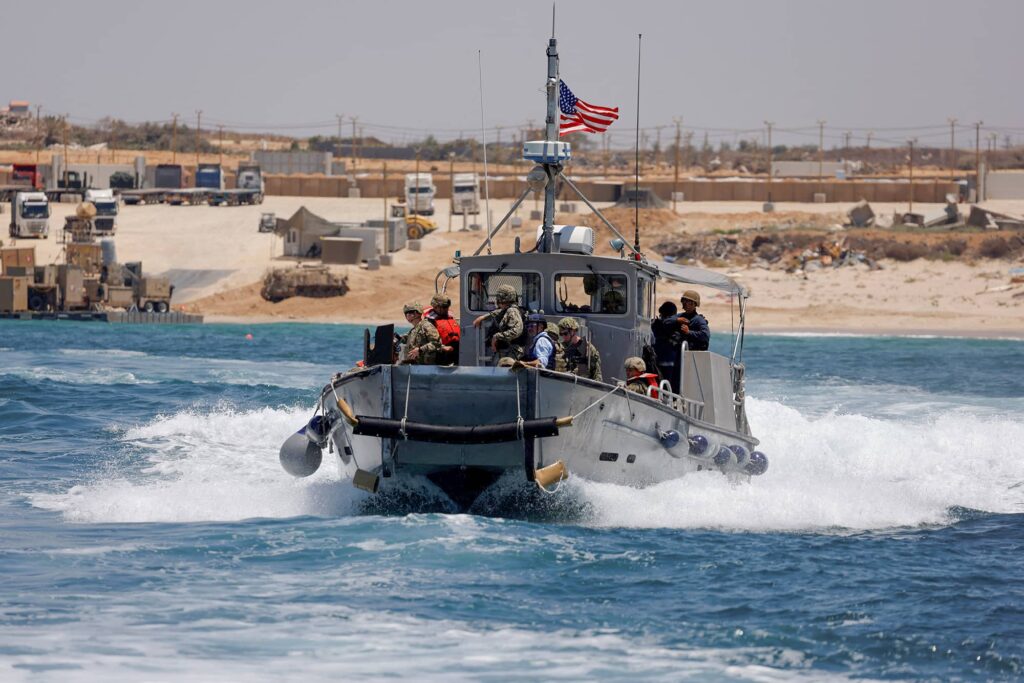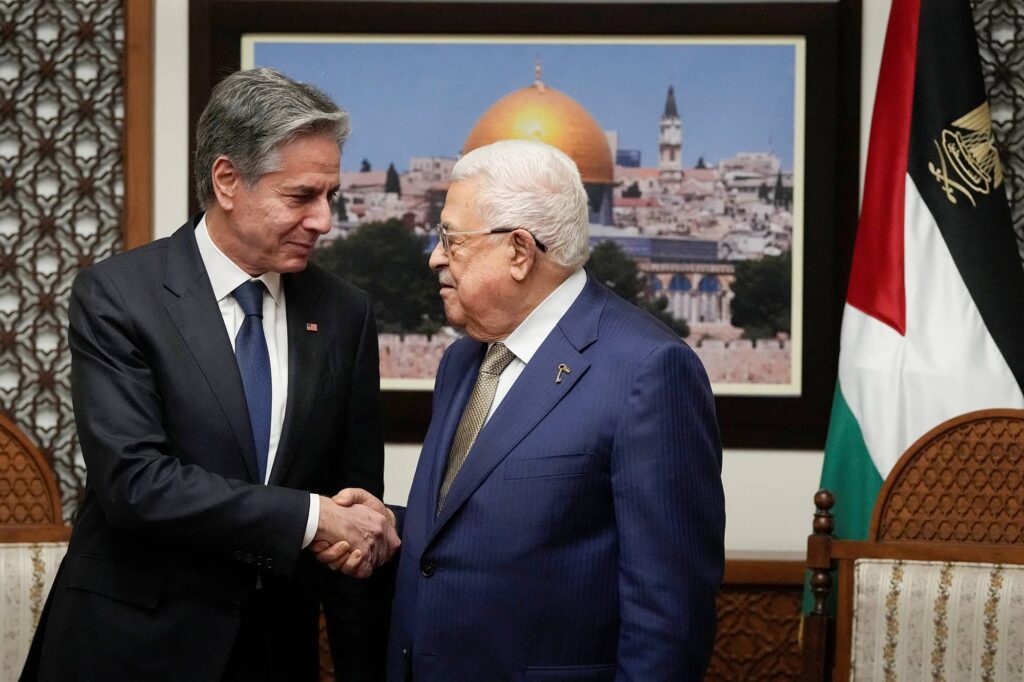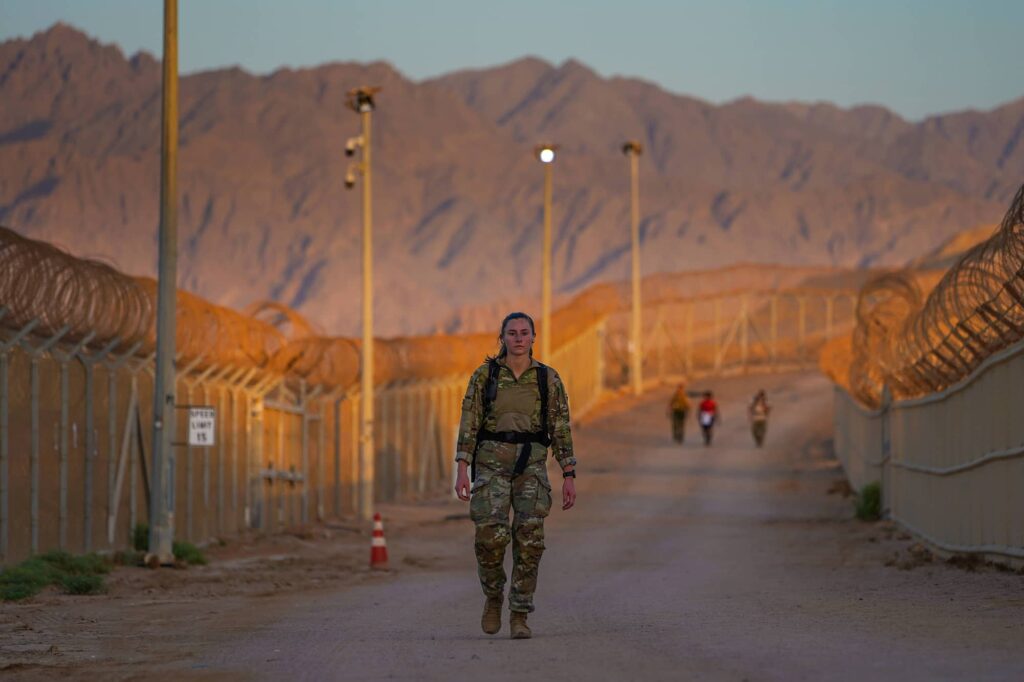“Don’t repeat our mistakes—we can do it ourselves.” This line occurred to me as I listened to discussions of “the day after” in Gaza. Plans and ideas need to address the detailed problems of implementation.
I do not pose as an expert on Israel or Palestinian affairs. Rather I draw from the painful lived experiences of serving in Iraq (2004-2005) and Afghanistan (2005-2007) and subsequent years working in and on Afghanistan and reflecting on other experiences from Vietnam to the Philippines.
My lessons are as follows:
- Reform of a corrupt, inefficient government through outside advisors is a mirage. We cannot substitute for effective local leaders or create them if they do not exist.
- Security must precede economic development. Trying to make major advances in both at the same time will not build local support.
- International Arab forces may be an important element of security, but they neither can nor will work on their own.
- A US role will be essential to the operation of the security force.
Meeting these challenges is possible but will require careful examination and understanding that there will be a high chance of failure. Above all, it will be important not to settle on a concept or idea without having carefully thought through how it is to be implemented.
Who governs?
If Israel is not to administer Gaza then another entity must do so. Some Israelis have considered growing a government out of the Gaza clans. The Biden Administration has called for a role for the Palestinian Authority (PA). The experience of Iraq and Afghanistan raises serious questions about both ideas.
The idea of using the clans in Gaza to govern requires that groups who have been largely powerless suddenly assume power and cooperate to utilize it responsibly and without the benefit of a demonstrated popular mandate. This is unrealistic. Real power and real money are at issue. The clans may have a political base, although how strong after years of Hamas suppression is speculative. What they do not have is power of their own. Their ability to govern will be challenged by Hamas and other radical groups.
Without forces of their own, they will be dependent on others. If they turn to Israel, they become puppets of a detested outsider. If they must turn to Arab forces or other outsiders, then they will find that they cannot depend on orders being followed because other nations will not simply abandon their authority over their own forces.
In both Iraq and Afghanistan, where there was much stronger leadership from the US than a clan government is likely to have, the forces of Canada, UK, Germany, Spain, Italy and others each responded to separate national directions and separate “red cards”—i.e., things they would not do without specific permission from their own governments. Such approval was rarely given and never quickly.
The history of Arab forces is more limited but not more inspiring. UAE special forces in Afghanistan were comparatively effective but most other Arab force presences were largely symbolic, unwilling to engage quickly or effectively. In Yemen, Saudi and UAE forces obeyed different political directives from home and developed separate political alliances.

Aside from security, considered more below, an authority in Gaza will be challenged to build a coherent and functioning authority out of today’s ruins while excluding Hamas from visible power. Lacking established power and probably unity, this authority is unlikely to be the result of the Gaza clans taking over. In Iraq we saw and are still seeing how the shifting power dynamics that result from depending on local political groupings to govern actually undermined coherent governance. In Afghanistan, the Parliament quickly became an auction house for moving foreign assistance and projects to MPs’ political supporters. Moving resources to supporters is in many respects a natural function of politics but when it is a raw contest for power unrestrained by established institutions and respected political norms it is unlikely to lead to coherent governance.
This brings one to the PA, which seems to figure prominently in what is known of the American proposals for administration. That the PA is both inefficient and corrupt is well known. The US answer is some form of political rebuilding of the PA. Perhaps that might be possible—but not in the time frame being discussed. Here the examples of Iraq and Afghanistan are particularly instructive but need to be examined in some depth.The underlying problems lay in leadership, not because leaders did not understand the value of better or even more honest government but because their other interests, including survival, took priority. If reducing support is likely to lead to loss of power, few leaders will willing commit political suicide. Large networks of support have been built on the ability to siphon off resources. This is unlikely to be voluntarily undermined in the interest of better government.
Pressure, through “conditionality,” was invoked as a solution by international donors for twenty years. It failed in both Afghanistan and Iraq. This is a complex subject but one of the main reasons is that the rewards of corruption go to the individual and pressure is applied to the state. If a person or party can put away millions of dollars in foreign lands the fact that aid may be cut off to the state is rarely a restraint on the behavior.
Selective and targeted pressure is possible but is difficult to manage without detailed knowledge and skill. I once cut off $10 million for diesel power in Kabul to force a policy change in the Ministry of Power. When nothing happened as a result it took time to understand that the minister thought my demands were actually a cover for forcing his removal. Thus, from his point of view, there was no reason to concede on the policy issue. Only when I was fortunate enough to find a local contact with the technical knowledge to understand what I sought, and the confidence of the minister to be believed, were we able to get a resolution. This is simply a small example of how difficult it is to apply even very targeted pressure.
Does this mean that reform is impossible? No, but it does underline the importance of local leadership committed to better governance for their own reasons. In the Philippines, President Ramon Magsaysay became famous for the kinds of governmental reforms and personnel appointments so critical to reform and to suppression of an insurgency. But in the case of Vietnam, when his friend and sometimes mentor, Edward Lansdale tried to persuade Vietnam President Ngo Dinh Diem to follow similar policies, the effort was largely unsuccessful. Ghana and Rwanda also show that reform and improvement in governance is possible but, as in the Philippines, the essential element is the determination of the national leader.
Even without a single, dynamic change in leaders, changes in political culture have happened. Taiwan and Korea have each moved from kleptocratic authoritarian governments to functioning and prosperous democracies. But these changes took decades. Without either long term changes in culture or dramatic changes in leadership, similar success stories are hard to find.
The US has been unwilling to confront the requirement of having either strong local leaders who want reform or very long term institutional and social change. Our national preference has been to increase money and advice in search of rapid change. This has been the story not only of Afghanistan and Iraq but also of Vietnam. The approach has failed.
That said, the circumstances could be different in Gaza. The PA has had effective administrators so there is capability, but such effective individuals were ultimately crippled by the senior political leadership. Without backing for reform from the most senior leaders, neither dedicated local bureaucrats nor outside advisors brought reform in Afghanistan or Iraq. How that would be different in Gaza will require considerable thought beyond short term advice and financing.

Security Challenges
Security trumps economic development in building political support. We had 20 years of trying to bring development without putting in place security in Afghanistan, on the theory that development would generate popular support. That effort failed. I do not mean that development can or should be ignored. But if local leaders cannot be reasonably assured of physical survival, they will not support the government.
This leads to some difficult issues. Hamas is likely to survive as at least a low-level movement with violent potential. The Palestine Islamic Jihad (PIJ) is still active, and a mapping of militant groups in Gaza lists several others and new ones may arise. A force that can successfully confront them will need to meet several requirements.
First, it will have to be militarily capable. PA forces are not numerous enough to do the full job on their own. An Arab force alone will have the debilities noted above. Moreover, the idea that Arab countries will put their forces in a position where they will have to kill Palestinian Arabs on behalf of Israeli security does not meet the laugh test, unless the governments concerned can relate operations directly to progress toward a Palestinian state. Such political linkage is part of US proposals. It is a high bar for Israeli politics.
Even assuming an international force with a significant Arab component can be constructed, it would need to be able to deal with Israeli security demands and requirements. Israeli requirements to suppress threats to Israel cannot and should not be ignored. In many respects, PA operations in the West Bank before the Gaza outbreak of October 7 did meet most Israeli requirements. But they did so in part with the involvement of US and other military advisors whose presence was essential both to the training of the force and to resolving tensions between the Palestinian and Israeli forces.
How a Palestinian or multinational force is to be trained, governed, and overseen is a significant issue. Neither the detailed plans nor the time needed to be functional have been spelled out. The adequacy of both plans and time needs to be considered before the concept is accepted, not after the force is on the ground.
Our own experiences in multiple countries, not just Iraq and Afghanistan, testifies to the fact that this type of operation is difficult and time consuming. American forces have excelled at building the capability of small units. They have largely failed to construct whole armies in the midst of combat.
The Legal Mandate
In the case of Gaza, there will be an additional issue. Israel can be expected to have repeated and strong demands for action of the security force on a wide range of recurring issues. Israel will have very good reasons to strike unilaterally if it perceives a threat. These day-to-day challenges will require prompt and decisive responses. That suggests some necessary elements. One is that the force providing security has the unity of command to respond effectively to challenges. If it has to seek guidance from some form of committee it is likely to be crippled and the Israelis will not be patient partners.
Secondly, the mandate of the security force must be strong enough for decisive, including lethal, action. The international record of agreeing to such a mandate is not encouraging. Pressures for compromises on everything from force equipment to rules of engagement can be expected in the search for multilateral political agreement, especially if UN Security Council agreement is required, as is likely. But watering down the mandate to secure political agreement will risk creating forces like UNIFIL in Lebanon or the early UN forces in Bosnia or Rwanda, that were reduced to being spectators of battle and even massacres.
There are examples of forces with the necessary mandate and leadership. Bosnia after the Dayton Accords provides the best example but there are others from smaller operations like that in Sierra Leone, led by the British, and the UN operations in East Timor with a multinational command and a heavily Australian led force as recounted by Lise Morage Howard. What is clear from these contrasting examples is that the mandate and leadership on the ground is critical. It would be better to give up the entire project than to accept a weak mandate or some form of committee leadership which would lead to probable failure of the policy because of weak execution.
It is possible to succeed in such a mission but, and it is a big but, trying to field the force and build it at the same time is fraught with the potential for failure—and failure would mean either the return of militants or Israeli occupation or both, and the unraveling of the political solution that depends on the force.

The Indispensable US role
The future civilian and military operations will need close linkage. If the security forces are too independent, then the civilian administration will quickly be seen as weak and useless. Israeli security demands are likely to clash with the views of the administering authority’s civilian leadership. There will be ample opportunities for confrontation. How is this to be handled without either compromising security or placing the civilian administration in a position where it has to choose between being seen locally as powerless or an Israeli puppet?
There are a variety of ways of avoiding the dilemmas of mandate, authority, and security described above. Whatever the course chosen, it will have to meet certain requirements. There will need to be a way of maintaining Israeli confidence in the security force but the Israelis cannot run it or either the PA and the necessary countries will not cooperate or the force will lose local political acceptance. This points to the need for a US military role. Other countries may be able to train and advise a local security force but only the US military is likely to have the credibility to assuage Israeli concerns.
This does not mean that US tactical forces must be employed. It does mean that US personnel will need to play a role in the overall operation of fielding a security force, managing its operations on the ground, and coordinating with the political authority. There is no other country with the required political weight and acceptance to play this role. If the current Biden Administration insistence on “no boots on the ground” prevents such a US role the odds against success will rise to dizzying heights.
The problems of the “day after” in Gaza are legion. It truly is a wicked problem. But if a solution is to be found, it will require close attention to the difficult areas of policy execution that extend well beyond the policy conceptions themselves.

